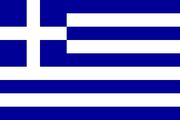
Flag of Greece
Greece, officially the Hellenic Republic, is a country located in southeastern Europe. Athens is the nation's capital and largest city.
History
Thurian Age / Upper Paleolithic[]
In 50,000, B.C., Tuk and Tanir continue their search for Atlantis, on the island of Crete, where they came across the people ruled by King Amir. They are being terrorized by the Hairy Ones, a tribe of primitives savages. Fighting them off, Tuk and Tanir were thanked and shown the path to Atlantis, who took them through the Valley of Mist.[4]<:-- relevant ? -->
Hyborian Age[]
For some reasons, Alexander of Macedon and his armies were briefly sent to the Hyborian Age, 10,000 years before their era,[5] and the descendants of those who stayed there invoked "Zoos", a god unknown to Conan.[6]
Around 8000 BC, at the end of the Hyborian Age beings known as the Olympians travelled from the interdimensional realm of Olympus via a nexus located on Mount Olympus to Earth. They began interacting with the Humans of the region who began to worship them.[7]
Eternals[]
The Eternals a genetic splinter group of humanity settled in the city of Olympia which was located in the fountains of Greece. One of the most active as the time was the exiled Forgotten One.[8] The Eternals were often mistaken for the Olympians. However, a non-interference pact was forged between Olympian ruler Zeus and Prime Eternal Zuras. As a show of good faith for their new found unity, Zuras' daughter Azura re-christened herself Thena, after Athena, daughter of Zeus.[9]
Helladic (Minoan or Bronze Age)[]
In 3650 B.C., the first Greek civilization to arise was the Minoans on the island of Crete lead by King Minos. His wife Pasiphae was cursed to full in with Bull of Crete sent by Zeus, and gave birth to Minotaur, a creature half man – half bull. King Minos was embarrassed, but did not want to kill the Minotaur, so he hid the monster in the Labyrinth. Later a warrior named Theseus came to the island as part of the annual tribute. Ariadne, daughter of King Minos, fell in love with Theseus and gave him a magic ball of thread to be dropped at the entrance of the labyrinth; it led Theseus to the Minotaur, which he killed, and he then followed the unwound thread back to the entrance.[10][11]
In 2060 B.C. a number of Greek citizens were captured and taken prisoner by the underground dwelling Ghouls. The properties of the Ghouls' domain preserved these Greek slaves for centuries, although to return to the surface would have met death as they had become vulnerable to the sun.[12]
Ancient Greece[]
Slaying of Medusa[]
Perseus was sent to kill the Gorgon; Medusa using his shield's reflective surface, Perseus beheaded Medusa and subsequently used her head as a weapon.[13][14]
Golden Touch[]
King Midas found the wandering Silenus, the Satyr and companion of the god Dionysus. For his kind treatment he was rewarded by Dionysus with a wish. The king wished that all he touched might turn to gold, but when his food became gold and he nearly starved to death as a result, he realized his error. He hugged his daughter a she was turned to gold.[15]
Hercules[]
The great hero Hercules was born in Thebes ancient Greece the son of Zeus, king of the Olympian gods, and Alcmena. Throughout his life he went on many adventures around Greece.[16]
Quest for the Golden Fleece[]
In 1289 B.C., Argonauts led by Jason gathered the mightiest warriors in Greece sailed to find the fabled Golden Fleece.[17]
Twelve Labors[]
Between 1271 B.C. and 1268 B.C. Hercules was best known for his celebrated Twelve Labors, which were performed in part to prove his worthiness for immortality to Zeus.[18]
Trojan War[]
In 1194, B.C., The Trojan War was a war between Greece (Greeks) and the City of Troy and its allies. The strife began after the Trojan prince Paris abducted Helen, wife of Menelaus of Sparta. When Menelaus demanded her return, the Trojans refused. Menelaus then persuaded his brother Agamemnon to lead an army against Troy. This lasted for many years[19]
Aeneas, a survivor of the Trojan War,[19] with the help of the Eternal Forgotten One, united the Etruscan tribes that would one day found Rome.[13]
Odyssey[]
After the Trojan War, Odysseus made a ten year journey across the Mediterranean Sea to reach his home, Ithaca; his adventures were recounted in the epic "Odyssey".[20]
In 600, B.C., On the island of Pyrrhus, Hercules battled Antaeus. This battle was witnessed by 20th Century time traveler Tommy Tyme.[21]
In 500, B.C., the Winged Inhumans were dying from starvation after leaving Attilan, forced to attack humans of Greece livestock for sustenance and were often mistaken for Harpies of myth.[22]
Macedonian Empire[]
In 356 B.C., Alexander the Great was born the heir to the King of Macedonia, Alexander studied under the philosopher Aristotle. He became a king himself, establishing a great empire from Greece to the eastern parts of Asia,[citation needed] including Egypt that he conquered while aiding the Egyptian repel of the Persian Empire in 330 B.C.[23]
In 323 B.C., after Alexander the Great's death, Lord Mormo of the Order of the Hydra went to the Temple of Athena on the Acropolis of Phaselis, Lycia, to retrieve the Spear of Achilles and his blood crusted into its blade, the key to immortality.[24]
In 200 B.C. A great Greek inventor, Archimedes utilized his intellect to build the Colossus of Rhodes, a massive mechanical construct with which he defended Rhodes against a Kree Sentry, defeating the Sentry, but at the cost of the Colossus.[25]
Roman Empire (146 BC–324 AD)[]
In 146 B.C., the Romans conquered Macedonia and then Greece. They even adopted many of the Greek customs and began worshiping the Olympian Gods, changing many of their names in the process.[26]
Around 50 B.C., Aphrodite encountered and fell in love with Narcissus, who rejected her love. She cursed him to meet someone who would not return his love and know heartbreak and torture. Narcissus found just that when he spied his reflection in a pond and fell in love with himself eventually turning into the flower that was named after him.[27]
Byzantine Empire (324–1453)[]
4th Century[]
When Roman Empire was split the eastern portion formed the Byzantine Empire. The capital was located in Constantinople.[7]
The region converted to Christianity and the Olympian withdrew from Earth.[7]
10th Century[]
In 970 A.D., a man known as Dr. Feerce was a scientist who lived in Greece. While experimenting with Chroma gas he was caught in an explosion that made him immortal.[28]
Ottoman Empire[]
15th Century - 18th Century[]
In 1460 A.D. Greece was captured by the Ottoman Turks who absorbed the nation into the Ottoman Empire.[7]
19th Century[]
Greek War of Independence[]
In 1821 A.D., the Greeks rebelled against Turkish rule. [7]
First Hellenic Republic[]
In 1827 A.D., the Greeks won their independence.[7]
In 1832, German; Prince Otto is chosen as the first king of independent Greece.[7]
In 1863, King Otto is deposed; Prince William of Denmark becomes king.[7]
20th Century[]
Second Hellenic Republic (1924–1935)[]
In the early 1930s, Greece was visited by Bill Waring, alias the Challenger, who uncovered an ancient society that was a holdover from ancient Greece. He survived their gladiatorial arena and dismantled the operation.[29]
World War II (1940-1944)[]
In 1940, Benito Mussolini's Fascist Italian forces attacked Greece. But the invasion failed. In 1941, Greece eventually fell due to the combined efforts of the Italians and the Nazi's invasion of the Balkans.[7] A member of the Royal family; Peter Kazantis went in exile. The United States military arranged to have exiled Kazantis sent back to Greece to unify the uncoordinated, disorganized, dissension-weakened and loosely affiliated alliance of guerrilla factions forming the Greek Resistance against the Axis occupation. Under the order of Captain Sam Sawyer, he was escorted by Nick Fury and the Howling Commandos. They met with Michael Skouras, leader of a powerful faction of Greek partisans within the Nazi occupation zone outside Athens. Both Kazantis and the Howling Commandos were briefly captured by the Nazis but soon escaped, and Kazantis was reunited with the Resistance, and he was instrumental in their unification.[30]
In 1943, Nazi forces were located on the Greek island of Crete. There they were beleaguered by British guerrilla fighters. When the Nazis had obtained stolen British fighters, they plotted to use them to attack Turkey in the hopes of turning the country against the Allies. This plot was foiled by the Sub-Mariner and British guerrillas.[31] In 1944, British and Greek forces combine to force Nazi withdrawal.[7]
Greek Civil War (1946-1949)[]
Following WWII an ensuing civil war ends with defeat of communist forces.[7]
Postwar Greece (1950–1973)[]
In 1952, a New constitution declares Greece a kingdom ruled by parliamentary democracy. Greece joins N.A.T.O..[7] American Secret Service agent Kent Blake was sent to Greece where he uncovered a communist spy cell operating out of a Greek prison.[32]
Greek military junta (1967–1974)[]
In 1967, Group of army officers seize power in military coup.[7]
In 1974, a Greece-backed coup for rule of Cyprus lead toan invasion from Turkey with an occupation of north of the island. The lead to the collapse of the dictatorship.[7]
Third Hellenic Republic[]
In 1975, Greece is declared a parliamentary republic under a new constitution.[7]
Modern Age[]
A chartered plan piloted by Tony Stark set down at a small airstrip in Eastern Greece, where he took a car and drove over primitive, seldom-traveled roads to an isolated stretch of coast overlooking the Aegean Sea. He then donned his Iron Man armor and began searching the area, looking for Madame Masque.[33]Points of Interest
Greece is split into thirteen first-level administrative entities.
- Athens (Capital City)
- Crete
- Central Greece
- Central Macedonia
- Thrace
- Peloponnese
- Ionian Islands
- Thessaly
- Olympia (formerly)
- Mount Olympus (Portal to the Olympian Realm)
- Monastic Republic of Mount Athos
- Aegean Sea
- Kalkhimithia[34]
- Sanctuary of Hercules[35]
Residents
See Also
- 199 appearance(s) of Greece
- 1 appearance(s) in handbook(s) of Greece
- 14 minor appearance(s) of Greece
- 60 mention(s) of Greece
- 8 mention(s) in handbook(s) of Greece
- 9 image(s) of Greece
- 49 article(s) related to Greece
- 240 citizen(s) of Greece
Links and References
References
- ↑ Marvel Atlas #1 ; Greece's entry
- ↑ 2.0 2.1 Marvel Illustrated: The Iliad #1
- ↑ Marvel Illustrated: The Iliad #5
- ↑ Captain America Comics #2
- ↑ Conan the Barbarian #79
- ↑ Conan the Barbarian #80
- ↑ 7.00 7.01 7.02 7.03 7.04 7.05 7.06 7.07 7.08 7.09 7.10 7.11 7.12 7.13 7.14 Marvel Atlas #1
- ↑ Captain America Annual #11
- ↑ Official Handbook of the Marvel Universe #11
- ↑ Official Handbook of the Marvel Universe A to Z #9
- ↑ Deadpool Team-Up (Vol. 2) #899
- ↑ Marvel Mystery Comics #11
- ↑ 13.0 13.1 Official Handbook of the Marvel Universe A to Z #8
- ↑ U.S.A. Comics #6
- ↑ Strange Tales #14
- ↑ Incredible Hercules #116
- ↑ Incredible Hercules #117
- ↑ Incredible Hercules #113
- ↑ 19.0 19.1 Thor Annual #8
- ↑ Marvel Illustrated: The Odyssey #1–8
- ↑ Young Allies #16
- ↑ Thor Annual #12
- ↑ X-Men: The Search for Cyclops #1
- ↑ Captain America: Hail Hydra #2
- ↑ S.H.I.E.L.D.: Infinity #1
- ↑ Official Handbook of the Marvel Universe #8
- ↑ Venus #3
- ↑ Marvel Mystery Comics #79
- ↑ Daring Mystery Comics #7
- ↑ Sgt. Fury #33
- ↑ All Winners Comics #9
- ↑ Kent Blake of the Secret Service #5
- ↑ Iron Man #24
- ↑ 34.0 34.1 Avengers #38
- ↑ Immortal Thor #13

